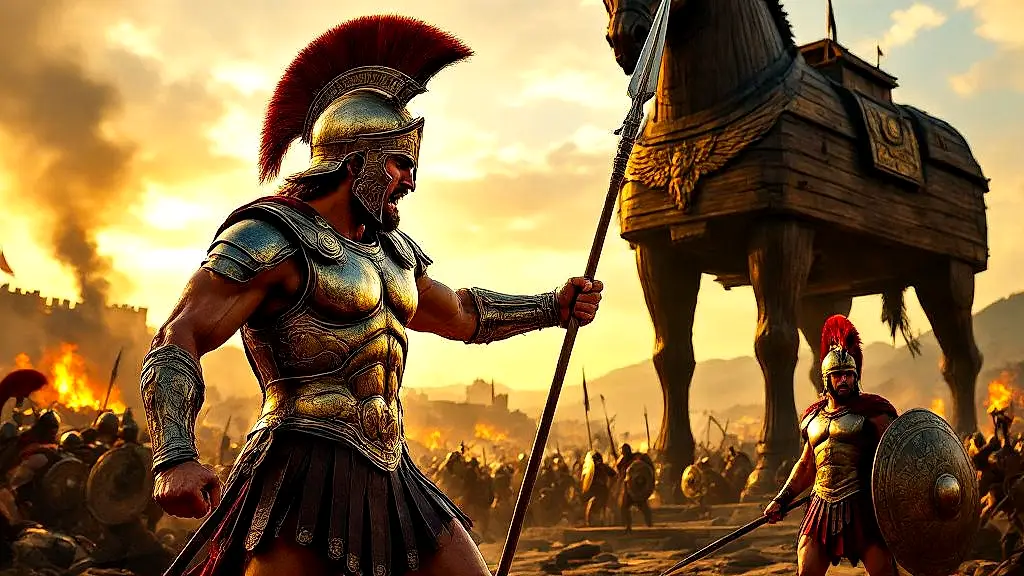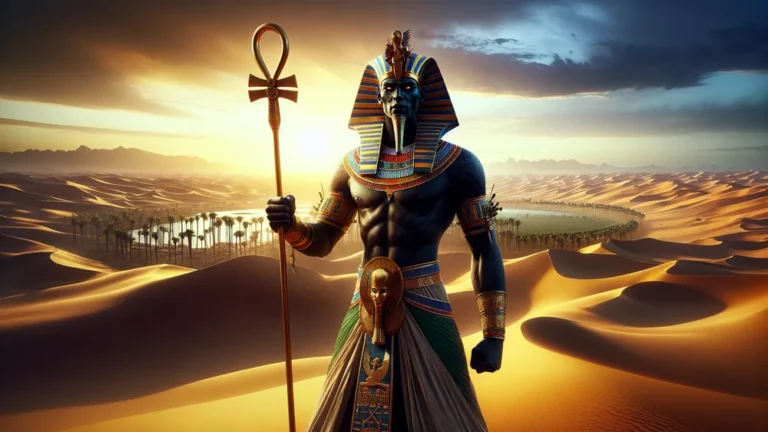The Trojan War In Greek Mythology: Key Events And Heroes
Picture a war so famous that its heroes, gods, and disasters shaped Western stories forever. The Trojan War, remembered in Homer’s Iliad and many other works, wasn’t only about a city. It was the most important event in Greek myths about heroes, where humans and gods fought during a ten-year siege. It’s like an ancient blockbuster story, with Achilles‘ anger, Helen’s looks, and Odysseus‘ cleverness lasting for thousands of years.
Key Points:
- The Trojan War started when Paris chose Aphrodite’s gift of Helen over power or wisdom, making Hera and Athena angry.
- For nine years, the Greeks and Trojans fought without a clear winner, with gods often stepping in to help their favorite side.
- Achilles stopped fighting after Agamemnon took Briseis, but returned after Hector killed Patroclus, leading to Hector’s death.
- The Greeks tricked the Trojans with a giant wooden horse, hiding soldiers inside to open the gates and destroy Troy.
- After Troy fell, Greek heroes faced hard journeys home, like Agamemnon being killed and Odysseus taking ten years to return.
- Aeneas escaped Troy with his family, later becoming an ancestor of Rome’s founders.
- The war marked the end of the Heroic Age, when gods and humans interacted closely, before moving to a time of less divine involvement.
However, was it real history, just a myth, or something in between? Ancient writers disagreed, and while archaeology proves Troy existed, the war’s details are still unclear. In this guide, we’ll explain how the war started, its key battles, and what happened after, distinguishing truth from storytelling. Whether you’re new to myths or know them well, get ready to learn about the war that created – and destroyed – heroes.
The Trojan War In Greek Mythology: Overview and Key Facts
| Category | Key Fact | Notes |
|---|---|---|
| Duration | Traditionally 10 years (1 year of active fighting after 9-year stalemate) | Some stories say it lasted even longer because the gods kept interfering. |
| Cause | Paris of Troy took Helen, wife of Menelaus, starting the conflict. | Different myths disagree – Homer says Paris took her, but Euripides suggests Helen left by choice. |
| Key Armies | Achaeans* (Greeks) vs. Trojans (allies: Dardanians, Lycians). | Achaeans means all Greek forces, including those from Mycenae, Sparta, and Ithaca. |
| Divine Sides | Pro-Greek: Hera, Athena, Poseidon. Pro-Trojan: Aphrodite, Apollo, Ares. | The gods changed sides often, usually because of personal grudges. Hera, for example, hated Paris. |
| Major Heroes | Achilles (Greek), Hector (Trojan), Odysseus (Greek), Paris (Trojan). | Heroes fought for kleos, meaning fame that lasts forever. |
| Turning Point | Death of Hector, then Achilles’ death, and finally the Trojan Horse. | When Hector died, Troy weakened. After that, Achilles was killed, and the Trojan Horse destroyed them completely. |
| Aftermath | Troy was destroyed; the Greeks had disastrous returns. | Odysseus wandered for 10 years (Odyssey), and Aeneas escaped to found Rome (Aeneid). |
| Sources | Mainly Homer’s Iliad (war) and Odyssey (aftermath). | Later writers, like Virgil, added more stories about Trojan survivors. |
How It All Began: What Started the War
The Trojan War started because of arguments among gods and decisions by humans. It all began at a wedding, when a golden apple led to one important judgment.
The Wedding of Peleus and Thetis
The Trojan War began because of events at the wedding of Peleus, a mortal hero, and Thetis, a sea nymph. Eris, the goddess of discord, showed up without an invitation and threw a golden apple marked with “To the Fairest” among Hera, Athena, and Aphrodite.
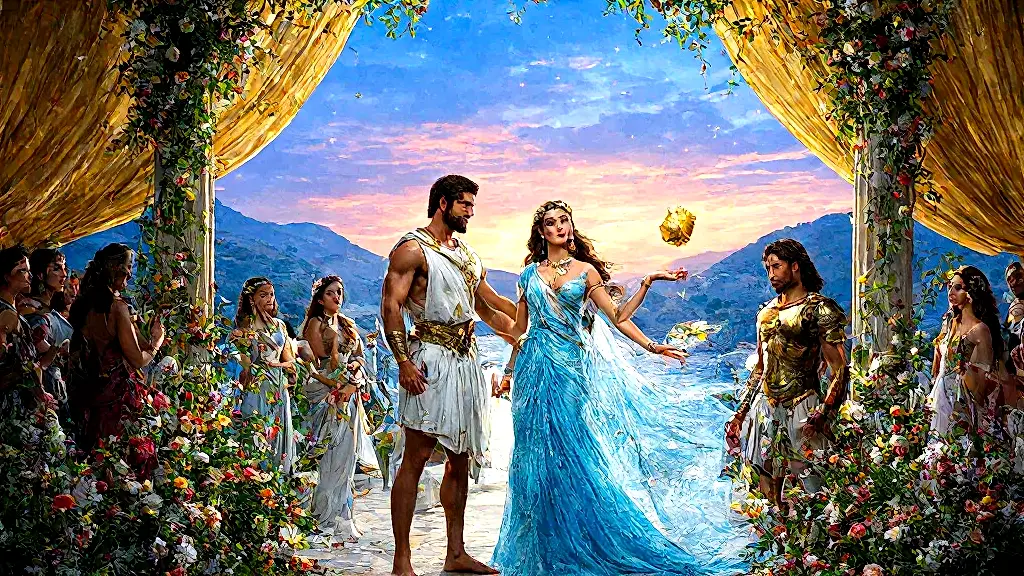
When each goddess claimed the apple, they tried to convince Paris, who turned out to be the judge, by offering gifts:
- Hera guaranteed imperial power: “You’ll rule the wealthiest kingdom on earth.”
- Athena vowed victory in battle: “You’ll become the greatest warrior alive.”
- Aphrodite proposed Helen of Sparta: “You’ll have the world’s most beautiful woman.”
Some accounts like the Cypria say Zeus arranged the competition to reduce overpopulation, while others blame Eris alone. Regardless of which version is true, this conflict led directly to Paris’s decisive judgment – and a war that would involve both gods and humans.
A fight over a golden apple at a wedding led Paris to pick Aphrodite’s offer of Helen, sparking the Trojan War.
Paris Makes His Choice
Paris was a Trojan prince who lived as a shepherd on Mount Ida because of a prophecy about Troy’s destruction. He suddenly had to judge a godly argument when the gods chose him to decide who deserved the golden apple. Some stories say Zeus picked Paris so he wouldn’t anger the goddesses himself.
When Hera, Athena, and Aphrodite had all made their case, Paris selected Aphrodite’s offer of Helen’s love instead of Hera’s kingdom or Athena’s battle skills. Paris didn’t choose just for love – he passed up power and wisdom, which started Troy’s downfall. The angry goddesses Hera and Athena swore lasting hatred against Paris. Other stories say this judgment took several days.
The goddesses supposedly bathed in a mountain spring to look their best before making final appeals to Paris.
Helen’s Kidnapping and the Kings’ Promise
When Paris visited Sparta as Menelaus’ guest, he broke the rules of sacred hospitality. Depending on the source, he either kidnapped Helen or left with her willingly, taking away Greece’s most beautiful woman. Because of this, the Oath of Tyndareus came into effect – a solemn oath all Helen’s former suitors had made to her father, where they swore to protect her husband.
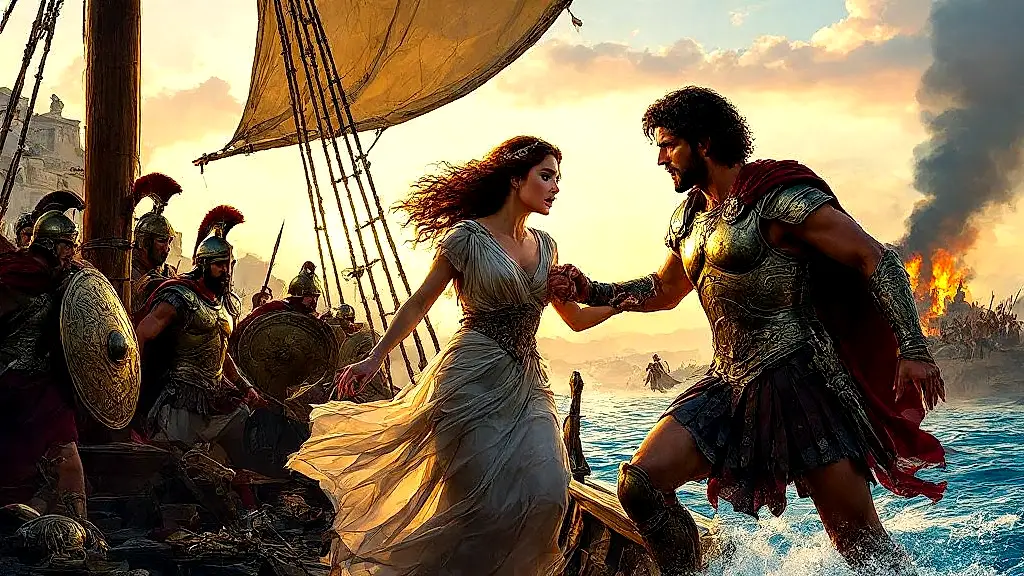
Legendary kings like Agamemnon, Odysseus, and Ajax now had to gather their armies. What began as a personal offense against Menelaus became a war involving all Greek kingdoms that would last ten years. The oath proved so strong that even Odysseus, who tried to pretend he was insane to avoid fighting, was forced to participate in the attack on Troy.
The Big Battles: Major Moments
What started as an argument over Helen became a decade-long conflict. Over those ten years, the war featured famous battles, gods interfering in human affairs, and many unfortunate events.
Nine Years of Deadlock and Small Fights
After the Greeks landed, the war became a long standoff that lasted nine years. Neither side could gain an advantage against Troy’s strong walls or defeat the other completely. The Greeks attacked nearby territories to weaken Troy’s allies, including when Achilles overran Lyrnessus and took Briseis captive. Meanwhile, Trojan allies like the Thracians launched their own attacks against Greek supplies.
During this time, smaller battles occurred which included capturing Tenedos, giving the Greeks an important base near Troy. The city itself remained always just beyond their grasp, slowly wearing down both armies.
Achilles Loses His Temper
The war changed when Agamemnon had to return his captive Chryseis and took Briseis from Achilles instead. This deeply offended Achilles, who then refused to fight for the Greeks. Without their best warrior, the army became much weaker, showing how personal honor sometimes mattered more than the war itself. When the Trojans started winning, Patroclus wore Achilles’ armor to help the Greek soldiers.
He fought well until facing Hector, who didn’t realize it wasn’t Achilles. After Patroclus died, Achilles’ grief turned to rage and he returned to battle. Hephaestus made new armor for Achilles, who then defeated many Trojan warriors. He killed Hector in single combat but didn’t stop there.
For several days, Achilles dragged Hector’s body around Patroclus’ tomb, breaking burial traditions that even gods followed. This showed how war could change even great heroes.
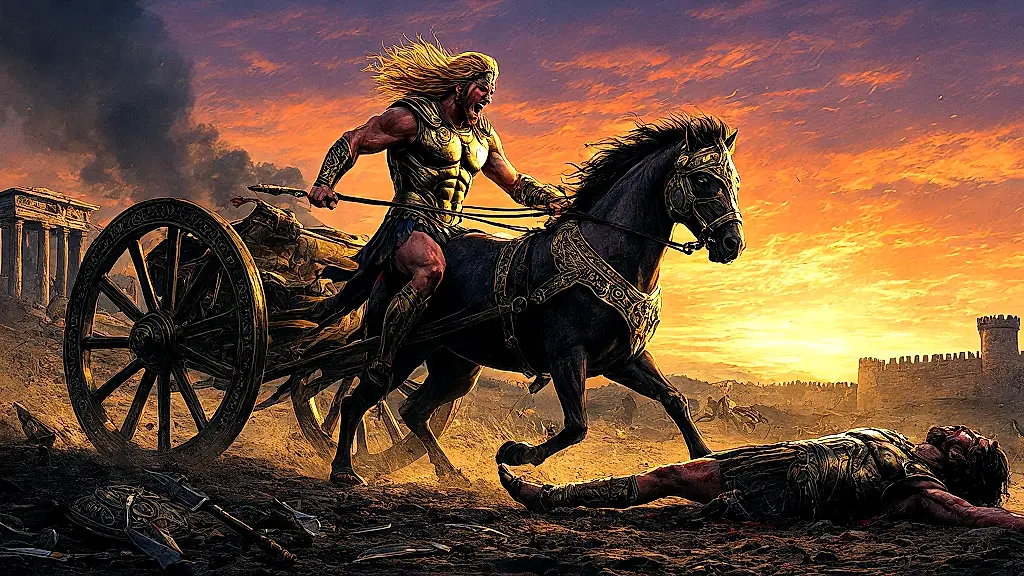
Games for Achilles’ Funeral
After burning Achilles’ body, the Greeks held special competitions to honor him. These events included both sports and ceremonies, with valuable prizes for the winners. They served two purposes: showing respect for Achilles and giving away his belongings.
The main competitions were:
- Chariot race: Diomedes won, while Antilochus demonstrated smart tactics (prize: a skilled woman and tripod)
- Boxing: Epeios defeated Euryalus (prize: a strong mule)
- Spear throw: Agamemnon competed against Meriones, though different stories disagree about who won (prize: decorated cauldron)
During the chariot race, Athena helped Diomedes win, while Apollo made Ajax lose in armed combat. This showed how gods kept affecting human events. The prizes, which ranged from useful animals to beautiful objects, revealed the Bronze Age system of rewards.
The Greeks honored Achilles with games that gave away his prized possessions while proving the gods still meddled in human affairs.
How the Heroes Died
The Trojan War caused heavy losses among famous warriors from both sides. Even demigods and strong fighters died in battle. These important deaths changed how the war progressed and showed that even strong warriors could be killed.
| Hero | Cause of Death | Killer |
|---|---|---|
| Hector | Spear to throat | Achilles |
| Patroclus | Spear and help from gods | Hector and Apollo |
| Achilles | Arrow to heel | Paris (with Apollo’s help) |
| Ajax the Great | Suicide by sword | Himself (after going mad) |
| Paris | Poisoned arrow | Philoctetes |
| Sarpedon | Spear | Patroclus |
| Penthesilea | Spear to chest | Achilles |
Most warriors died from spears, which were common weapons for direct combat. Others like Paris fell to arrows, which warriors considered less honorable.
This interesting pattern shows that heroes often died not just from equal opponents, but with gods involved or in unexpected ways.
Gods Jump In: Their Role in the War
During the war, mortals fought and died on the battlefield. The gods were the main influencers, and their arguments and actions affected key moments in the conflict.
Taking Sides on Olympus
The Olympian gods chose sides they typically favored in conflicts. Hera and Athena were angry about Paris’ judgment, which made them strongly support the Greeks. Hera influenced battles, while Athena also helped favorites like Diomedes and Odysseus. Poseidon officially stayed neutral but preferred the Greeks. He was still upset about building Troy’s walls without proper thanks. Meanwhile, the Trojans had their own divine supporters.
Aphrodite protected Paris and Helen, her rewards from the Judgment. Apollo defended Troy, his important city, and healed wounded Trojans like Chryseis. Ares first backed the Trojans until Athena defeated him in battle. This showed that the gods’ alliances depended on personal reasons as much as strategy.
Apollo’s Punishment and Thetis’ Request
When Agamemnon refused to send back Chryseis to her father, Apollo responded with an unseen attack. For nine days, he sent a plague that killed many in the Greek camp. But when Achilles gathered the leaders, they understood this was punishment from the gods. They returned Chryseis and made sacrifices to calm Apollo’s anger. This showed that even strong armies couldn’t resist angry gods.
At the same time, Thetis used her special relationship with Zeus, which she earned by helping him against a rebellion. She met with Zeus privately and convinced him to help the Trojans win battles until Agamemnon properly honored her son Achilles. This showed that personal connections among gods affected the war directly. Zeus gave hesitant approval, despite Hera’s doubts, which caused Hector’s later victories in battle.
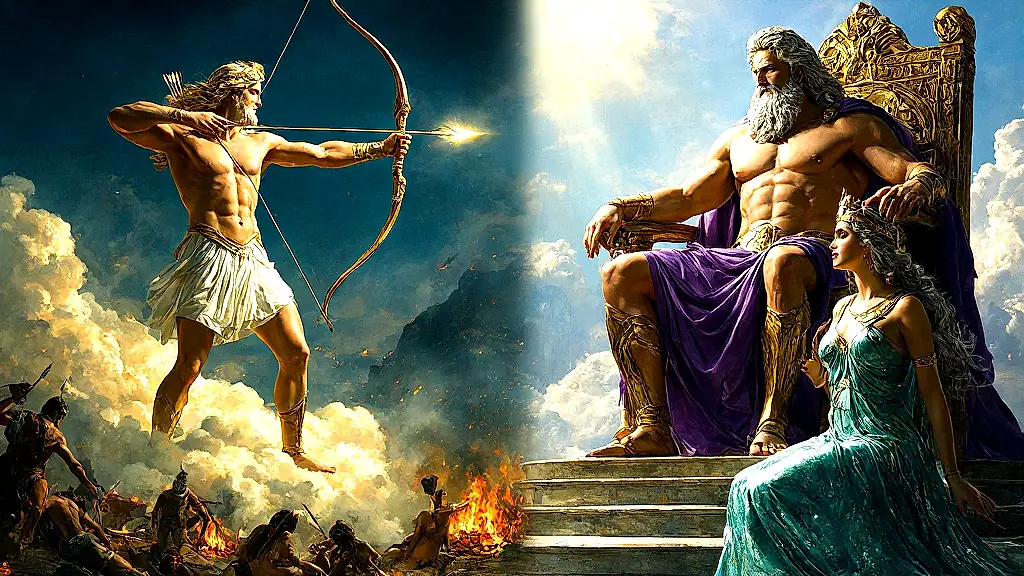
Troy’s Final Days
The gods’ plans were already working while the Greek army urgently needed victory, making Troy’s future uncertain. This led to what became the most famous ending to a siege in ancient history.
The Trick with the Trojan Horse
After nine years of failed attacks, Odysseus created a clever military trick – a large wooden horse that they built from cut trees, with elite Greek warriors hidden inside. The Greeks faked their retreat by burning their camp and sailing to Tenedos, which could be seen from Troy. They left only Sinon behind as their fake deserter.
Their fake retreat succeeded exactly as planned. The Trojans thought the horse was either a sign from the gods or a peace offering, even though its size matched their city gates perfectly. The trick worked because of three important parts:
- Sinon acted convincingly as a scared Greek soldier who was left behind
- They placed the Trojan Horse carefully just outside Troy’s walls
- When Laocoön warned against the horse, sea serpents killed him, and the Trojans thought this was punishment from the gods
During the night, the hidden warriors came out from inside the horse. While Sinon signaled the Greek ships with a torch, the warriors inside killed Troy’s guards and opened the gates. This attack from inside the city caught the celebrating Trojans completely by surprise, killing them during their celebration.
The Greeks tricked the Trojans with a huge wooden horse hiding soldiers inside, then attacked at night while the city celebrated.
Troy Gets Destroyed
The destruction of Troy reached its violent end when Neoptolemus, Achilles’ ruthless heir, entered the royal palace. He found old King Priam at Zeus’ altar, seeking protection. Then he broke the sacred rules and dragged the king across the bloody floor. He murdered Priam at the same altar where Hector had once been cleansed – a grim repetition of Achilles’ threats.
This killing of a king, that Virgil describes in the Aeneid, marked the end of Troy’s royal family as the Greeks killed them all. The same happened to Hector’s baby son Astyanax. Some stories say Odysseus ordered soldiers to throw the child from Troy’s walls, while others say Neoptolemus did it.
When they threw him onto the stones where his father once fought, it showed how war affects everyone, even children. This became one of the most terrible moments in the story of Troy’s fall.
What Happened After
When the fires died down in Troy’s destruction, the Greek victors learned their struggles weren’t over. But their journeys home turned out to be just as hazardous and life-changing as the war itself.
The Bitter Homecomings
Agamemnon’s victorious homecoming to Mycenae ended badly when his wife Clytemnestra killed him. She was furious he had sacrificed their daughter Iphigenia and brought Cassandra home as his lover. Clytemnestra trapped him in a robe and stabbed him. Her revenge, shown in Aeschylus’ plays, started a series of killings that only ended when gods stepped in during Athens’ first murder trial.
The bloody scene, that included Cassandra’s warnings no one heeded, became a famous warning story about war’s consequences. Meanwhile, Odysseus experienced a different but equally difficult journey home. His ten-year trip challenged his cleverness at every turn. He escaped the Cyclops‘ cave, though his “Nobody” trick caused problems later. On Circe’s island, he faced men turned into animals.
The gods who disagreed about what should happen to him made his trip longer – Athena helped him while Poseidon punished him for blinding his son. These godly arguments created many obstacles for Odysseus.
Aeneas’ Escape: From Troy to Rome
When Troy’s fall came, Aeneas showed his family loyalty in a famous act. He carried his old father Anchises on his back while holding his son’s hand, leading his family to safety. They fled with Troy’s household gods, which were important family statues. Virgil’s Aeneid tells how this journey became the story of Rome’s beginnings.
After leaving Troy, they traveled across the Mediterranean, which included the failed relationship with Dido of Carthage. Eventually they reached Italy, where Aeneas’ descendants would later found Rome. This made Aeneas the ancestor of Rome’s first rulers.
The Heroic Age Fades Away
The Trojan War signaled the end of the Heroic Age, when gods still had children with humans. This period created heroes such as Achilles and Aeneas. After this came what Hesiod called the Iron Age, where he complained people would always work and suffer. This important change from warriors in bronze armor to ordinary people explains why Greeks admired Trojan War heroes.
They were the last ones who fought beside Olympians, like when Diomedes injured Ares. Then the gods pulled back and stopped helping humans directly, beginning what we might call mythology’s first time of divine non-interference.
The Trojan War marked the last time gods fought alongside humans, ending an era of heroes and starting a time when people had to struggle without divine help.
FAQs
1. Who actually won the Trojan War?
The Trojan War was won by the Greeks through Odysseus’ cunning Trojan Horse stratagem.
2. Was Helen of Troy a willing captive?
Helen of Troy’s willingness is debated, with Homer depicting her as abducted but Euripides suggesting she may have fled willingly with Paris.
3. How did Achilles die?
Achilles died when Paris shot him in the heel with an arrow guided by Apollo.
4. Why did the gods support different sides?
The gods supported different sides due to personal grudges, like Hera and Athena’s anger over Paris’ Judgment favoring Aphrodite.

